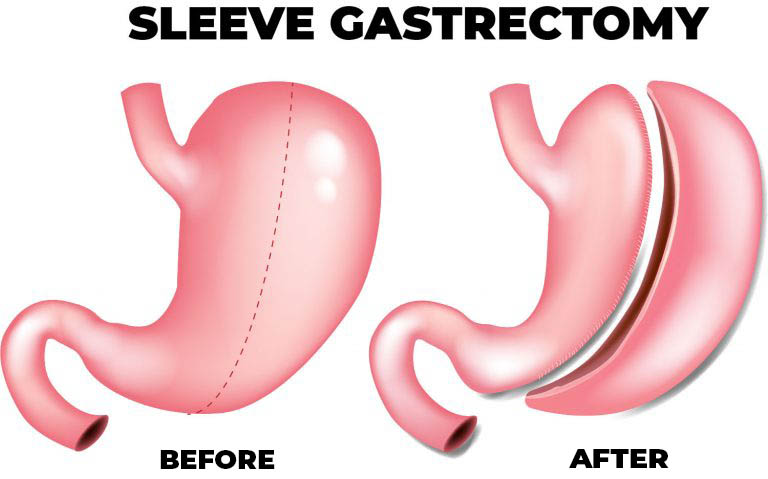The International Bariatric Clinic at Szpital na Klinach
Sleeve Gastrectomy
Sleeve gastrectomy is a method recommended mainly for patients with a BMI between 35 and 40 and who have diseases secondary to obesity, such as hypertension, obstructive sleep apnea, or type 2 diabetes. This surgery is also beneficial for patients with a higher BMI, especially if their obesity is accompanied by significant risk factors that prevent other, more advanced surgeries. Often a multi-stage treatment is used in such cases, and a sleeve gastrectomy is recommended as the first stage. After adequate weight reduction, risk factors are reduced, so the second stage, which is most often gastric bypass, may be considered. Sleeve resection is also a good solution for people diagnosed with bowel diseases, or who have undergone bowel surgery in the past, and likely have post-operative adhesions inside the abdomen. This type of surgery is also recommended for young or elderly patients. The procedure is generally not recommended for patients with gastroesophageal reflux disease. The procedure involves removing a part of the stomach and shaping it so that the patient can only consume small amounts of food before feeling satisfied, which allows for rapid weight loss. As part of the surgical treatment of our bariatric patients at Szpital na Klinach, we provide the expertise of a bariatrician, dietician, and psychologist throughout their entire treatment period to ensure a comprehensive medical support network and the best possible outcomes.
What is the “Sleeve Gastrectomy” procedure?
The surgery consists in removing a part of the stomach along the greater curvature so that the remaining segment of the stomach can only hold approximately 150-250 ml of food. Additionally, the smaller stomach size causes less overall secretion of ghrelin, the so-called ‘hunger hormone’, and therefore earlier feelings of being satisfied with your meal. This is how you may rapidly lose significant excess body weight in the first 6-12 months after the operation. You will help achieve your long-term weight goals by adjusting your behavior in the early post-operative period through breaking food into smaller pieces and eating much smaller portions. This is a critical step in your recovery and in getting used to the lifestyle changes you will have since this procedure permanently reduces the volume of your stomach and is irreversible.
The standard length of hospital stay: up to 3 days

Preparation for the procedure
Laboratory tests:
- blood count, blood group, and Rh factor
- basic tests (sodium, potassium, glucose)
- EKG
- gastroscopy
- other tests ordered by your doctor
Benefits:
- Shorter treatment time
- Patients lose about 50% of their excess body weight in the first 6-12 months after surgery
- Inhibition of ghrelin secretion, which reduces the feeling of hunger and enables faster weight loss
What to expect immediately after surgery and during recovery:
- Stand up and walk within a few hours
- Liquid or mixed diet for the first 2 weeks
- Return to full activity within 2 weeks
Potential complications:
- Bleeding where a section of the stomach was removed
- Leakage of stomach contents where the part of the stomach was removed
- Damage to the spleen during surgery
- Nausea and vomiting
- Gastroesophageal reflux
- Inflammation of the esophagus

